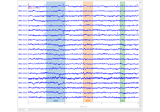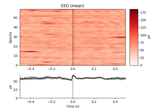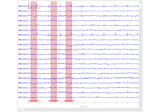mne.preprocessing.find_ecg_events#
- mne.preprocessing.find_ecg_events(raw, event_id=999, ch_name=None, tstart=0.0, l_freq=5, h_freq=35, qrs_threshold='auto', filter_length='10s', return_ecg=False, reject_by_annotation=True, verbose=None)[source]#
Find ECG events by localizing the R wave peaks.
- Parameters:
- rawinstance of
Raw The raw data.
- event_id
int The index to assign to found ECG events.
- ch_name
None|str The name of the channel to use for ECG peak detection. If
None(default), ECG channel is used if present. IfNoneand no ECG channel is present, a synthetic ECG channel is created from the cross-channel average. This synthetic channel can only be created from MEG channels.- tstart
float Start ECG detection after
tstartseconds. Useful when the beginning of the run is noisy.- l_freq
float Low pass frequency to apply to the ECG channel while finding events.
- h_freq
float High pass frequency to apply to the ECG channel while finding events.
- qrs_threshold
float|str Between 0 and 1. qrs detection threshold. Can also be “auto” to automatically choose the threshold that generates a reasonable number of heartbeats (40-160 beats / min).
- filter_length
str|int|None Number of taps to use for filtering.
- return_ecgbool
Return the ECG data. This is especially useful if no ECG channel is present in the input data, so one will be synthesized. Defaults to
False.- reject_by_annotationbool
Whether to omit bad segments from the data before fitting. If
True(default), annotated segments whose description begins with'bad'are omitted. IfFalse, no rejection based on annotations is performed.New in version 0.18.
- verbosebool |
str|int|None Control verbosity of the logging output. If
None, use the default verbosity level. See the logging documentation andmne.verbose()for details. Should only be passed as a keyword argument.
- rawinstance of
- Returns:
- ecg_events
array The events corresponding to the peaks of the R waves.
- ch_ecg
str Name of channel used.
- average_pulse
float The estimated average pulse. If no ECG events could be found, this will be zero.
- ecg
array|None The ECG data of the synthesized ECG channel, if any. This will only be returned if
return_ecg=Truewas passed.
- ecg_events
See also


